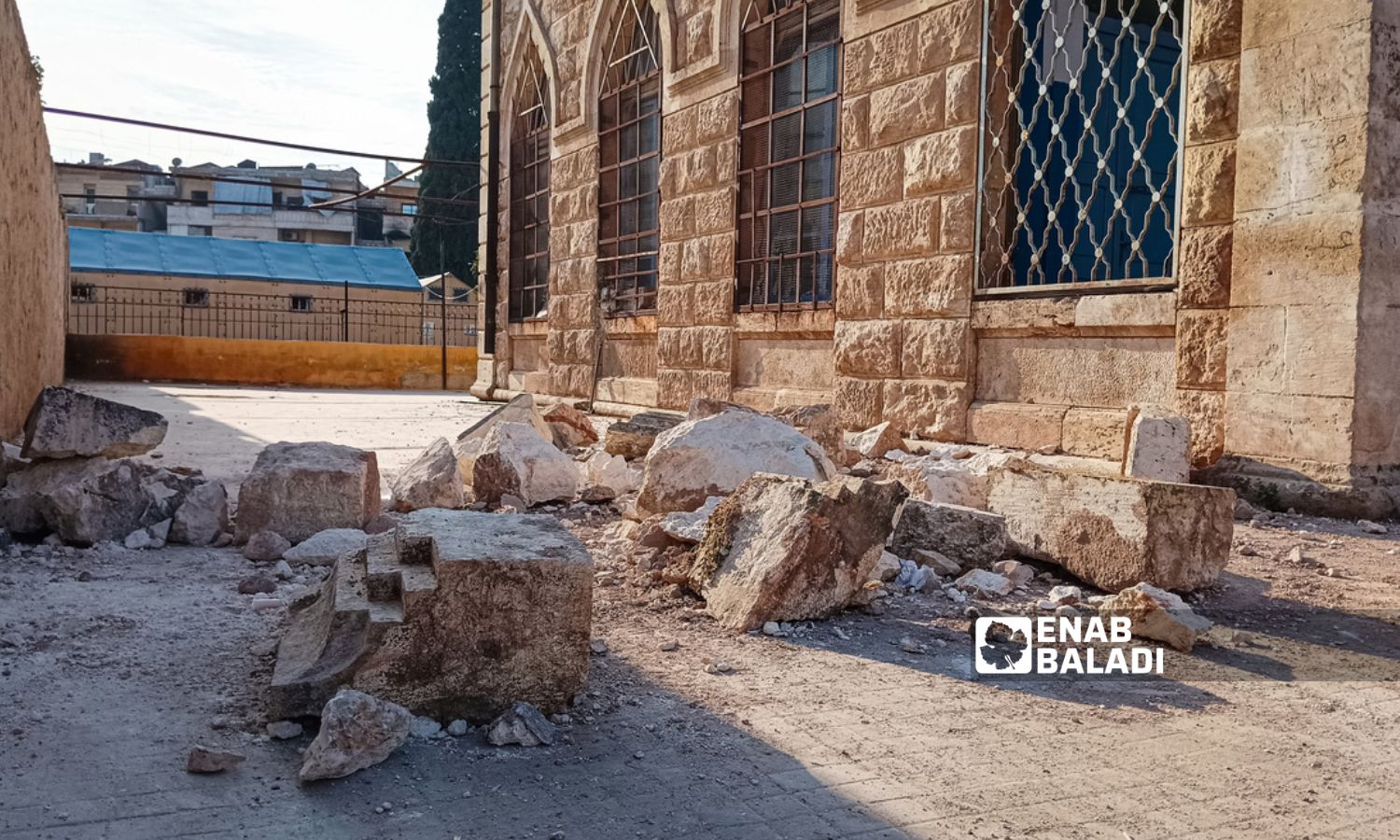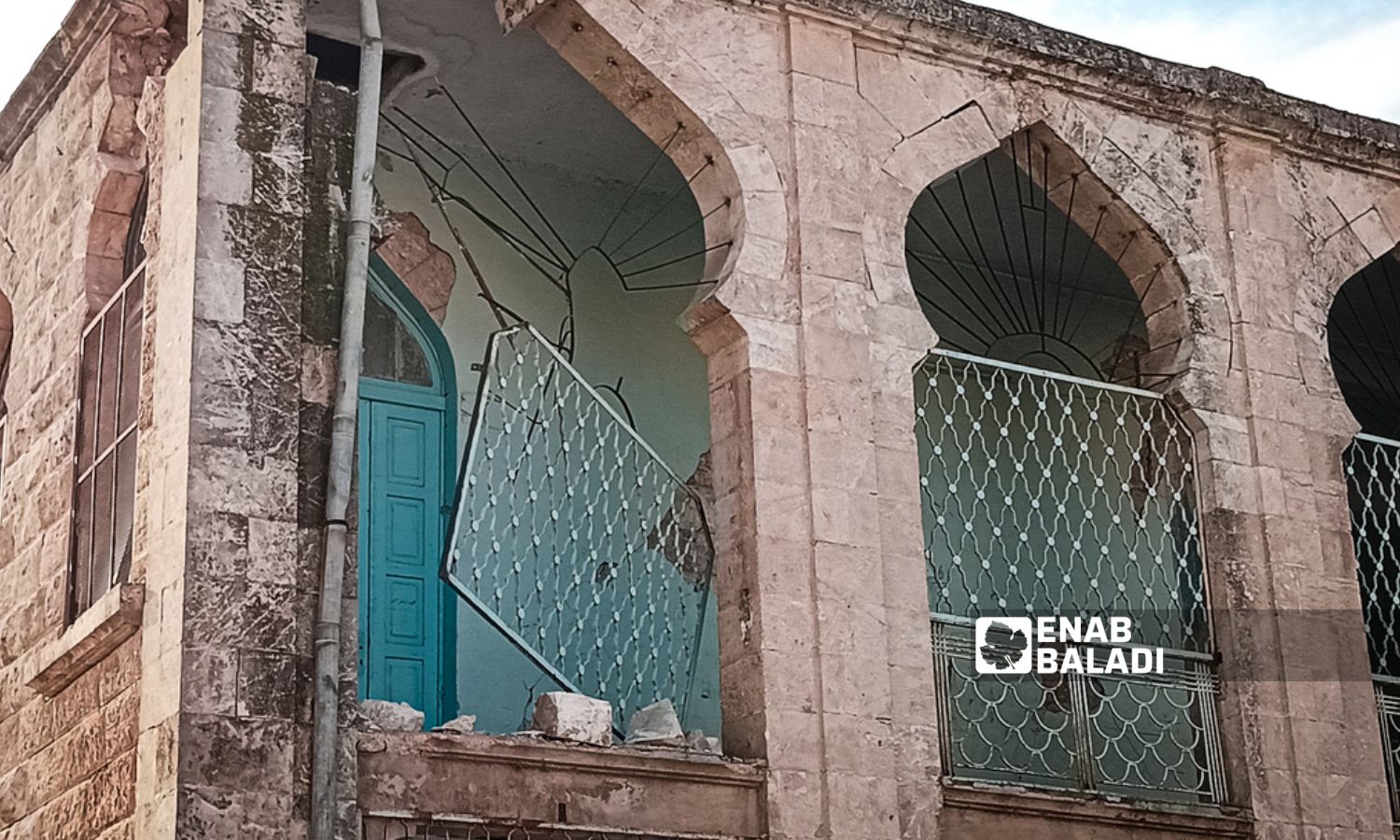



Enab Baladi – Anas al-Khouli
The dilapidated education sector in the northwestern region of Idlib was struck by the earthquake and left a few steps away from collapse after the sector witnessed for years continuous threats due to the severe lack of support.
The massive earthquake of February 6 caused great damage to educational buildings, as the number of schools affected in the latest statistics issued by the Syrian Salvation Government (SSG) reached 250 schools, including 203 partially damaged schools, one school completely demolished, and 46 schools with minor cracks amid increasing concerns about the extent of damage that could have affected educational buildings.
Hours after the first earthquake that hit Turkey and Syria, the Salvation Government’s Education Ministry issued a decision to suspend working hours in public and private schools until the 10th of the same month.
This was followed by a decision to suspend working hours until February 20, until the competent committees can verify the safety of the buildings.
However, another earthquake struck southern Turkey, affecting the regions of northern Syria, on the evening of the same day, which impeded the resumption of school hours, and the suspension was extended until the 25th of the same month amid growing fears about the extent of damage that could have affected educational buildings.
The deputy minister of education in the Salvation Government, Khaled Salibi, told Enab Baladi that the number of damaged schools that are completely out of service is more than 100, most of which are in the town of Harem in the northern countryside of Idlib.
He added that the areas that were directly exposed to the earthquake line were Salqin, Harem, Termanin, al-Atarib, and al-Mand, and they suffered great damage to the infrastructure of educational buildings. As for the other areas, most of the buildings are subject to restoration.
For his part, Mohammad al-Dado, director of School Buildings at the Education Ministry, told Enab Baladi that the ministry, in cooperation with the Engineers Syndicate in Idlib, has formed a special committee to inspect schools, assess damages, and the possibility of restoring damaged schools.
According to the committee’s assessment, the number of schools whose damage is considered serious has reached more than 100, which makes it impossible to return to them at the present time.

Taha Zidan school after it was partially damaged by the earthquake in Idlib countryside – February 25, 2023 (Enab Baladi/Anas al-Khouli)
Many families who were forced to flee to separate areas due to the earthquake fear that they will not find new schools, according to an opinion poll conducted by Enab Baladi.
Families are also afraid to return to schools in light of the continuing aftershocks and the presence of many educational buildings affected by the earthquake.
Mohammad al-Obaid, 34, said that his eight-year-old daughter, Hala, insisted on taking her school bag before leaving their house, which cracked after the first earthquake.
Hours after leaving their home in the town of Harem, the house fell due to aftershocks, forcing them to stay in a shelter in Idlib.
While the child is still suffering from the effects of psychological trauma after the earthquake, her father believes that her return to school can alleviate this, as she is very attached to the school and its teachers, but their displacement will not allow that soon, according to al-Obaid.
Laila al-Mustafa, 39, and her husband are trying to find a house to rent instead of their house, which was destroyed in the earthquake. She fears the difficulty of finding a new school for her three children.
Al-Mustafa told Enab Baladi that their financial situation is hindering them from finding an apartment to live in. It will also impede, later, securing school supplies and the needs of her children after everything they owned was lost under the rubble of their house.
Al-Mustafa considers that the return of her children to school, even if the family can secure the necessary needs, is a terrifying idea amid the continuing fear of aftershocks.
Teacher Hussam Ezz El-Din told Enab Baladi that the disaster exceeds the capabilities of the Directorate of Education, which makes it extremely difficult to provide solutions for affected students and teachers.
Ezz El-Din pointed out that most of the teachers used to practice their work voluntarily, but many of them will not be able to do so at the present time.
Meanwhile, the Ministry of Education is working to create groups in safe schools after the decisions of the committee responsible for inspecting schools were issued, according to Khaled Salibi, the Deputy Minister of Education.
It is also working to provide shelters with temporary schools in tents, while safe schools close to shelters must receive children who wish to do so, said Salibi.
He pointed out that schools must accommodate large numbers of students during disasters.
Salibi added that this is being done in conjunction with studying the possibility of rebuilding schools in the affected areas.
The education sector in Idlib has been suffering for many years due to a lack of support amid calls for the concerned authorities to save the future of students in the region and to give teachers their rights.
In Idlib, there are several bodies tasked with organizing the educational sector, namely the Directorate of Education in Idlib governorate, the Ministry of Education, and the Syrian Teachers Syndicate. Despite the existence of these bodies, they have failed to secure support for teachers.
In a previous report, Enab Baladi discussed the conditions and reality of teachers in Idlib governorate. It also shed light on the sources of pensions, the funding agencies, and the reasons for irregular support for the education sector in the region.
if you think the article contain wrong information or you have additional details Send Correction